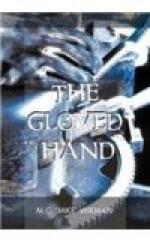I approached and looked at it, then tried the door, but it was locked.
“To open this, we must know the combination,” I said; “or else we shall have to get an expert.”
“I know the combination,” she broke in; “it is ...”
But I stopped her.
“My dear Miss Vaughan,” I laughed, “one doesn’t go around proclaiming the combination of a safe. How do you happen to know it?”
“My father often had me open the safe for him.”
“Does anyone else know it?”
“I do not think so.”
“Well, suppose we see what is in the safe,” I suggested, and, as she knelt before it, turned away. I, at least, did not wish to know the combination. That Silva already knew it I accepted as certain.
I heard the twirling of the knob, and a sharp click as the bolts were thrown back. Then I walked to Miss Vaughan’s side and knelt beside her. The interior of the safe was divided into the usual compartments, one of them equipped with a Yale lock. The key was in the lock, and I turned it, swung the little door open, and drew out the drawer which lay behind it.
“If there is a will, it is probably here,” I said; “let us see,” and I carried the drawer over to the light.
Miss Vaughan followed me, but Silva had sunk back into his chair, and was staring abstractedly through the open door out into the darkness, as though our proceedings interested him not at all. Then, as I looked into the drawer, I gave a little gasp of astonishment, for it was almost filled with packets of bills. There were five of them, neatly sealed in wrappers of the National City Bank, and each endorsed to contain ten thousand dollars.
“Why did your father require all this money?” I asked, but Miss Vaughan shook her head.
“He always kept money there,” she said, “though I never knew the amount.”
[Illustration: “Oh, Master, receive me!”]
I glanced at the yogi, but his revery remained unbroken. Then I laid the packets on the table and dipped deeper into the drawer. There were two bank-books, some memoranda of securities, a small cash-book, and, at the very bottom, an unsealed envelope endorsed, “Last will and testament of Worthington Vaughan.”
“Here we are,” I said, took it out, and replaced the rest of the contents. “Shall we read it now?”
“Yes, I should like to read it,” she answered quietly.
The document was a short one. It had evidently been drawn by Vaughan himself, for it was written simply and without legal phrases. It had been witnessed by Henry and Katherine Schneider, and was dated only a week previously—but three days before the murder.
“Who are these witnesses?” I asked.
“They are the cook and the gardener.”
“Do you recognise your father’s writing?”
“Oh, yes; there can be no question as to that.”




